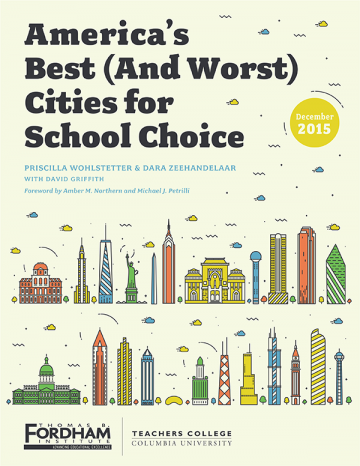Children, be quiet and watch your lesson
Michael J. PetrilliBy Michael J. Petrilli
Building a better (community) college student through remediation
Jeff MurrayBy Jeff Murray
High-potential students thrive when school districts develop sustainable gifted services
The goal of gifted programs should reflect that of any other educational program: to engage students with appropriately challenging curricula and instruction on a daily basis and in all relevant content areas so that they can make continual academic growth.
Elementary-grade reading in Tennessee
Robert PondiscioOver the past decade, Tennessee has seen steady growth in math, science, and social studies scores. Those gains have been accompanied, as in many states, by rising high school graduation rates. But all is not well in the Volunteer State.
Advocating for high-achievers
Brandon L. WrightThanks to No Child Left Behind and its antecedents, American education has focused in recent decades on ensuring that all children, especially those from poor and minority backgrounds, attain a minimum level of academic achievement.
A culturally rich curriculum can improve minority student achievement
Audrey KimFor some, the ivory tower of academia is “ivory” in more ways than one.
Don't blame Common Core for publishers' lousy textbooks
Kevin MahnkenIf you’ve been keeping up with the Common Core scandal pages, you may be wondering who Dianne Barrow is.
NAEP computer-based writing pilot assessment: Fourth-grade performance
Amber M. Northern, Ph.D.A new study from the Department of Education’s Institute of Education Sciences provides results for fourth-grade students on the 2012 NAEP pilot computer-based writing assessment. The study asks whether fourth graders can fully demonstrate their writing ability on a computer and what factors are related to their writing performance on said computers.
The Bush education plan
Chester E. Finn, Jr.Education reform has been a specialty of Jeb Bush’s, and his track record on this issue in Florida is unbeatable. He knows the topic up, down, and sideways.
Ten things every American should know
Robert PondiscioNearly thirty years ago, a then-obscure University of Virginia professor named E.D. Hirsch, Jr. set off a hot national debate with the publication of Cultural Literacy.
Has your child's elementary school stopped teaching history, science, and other content? Here's how to do it yourself
Michael J. PetrilliIn a perfect world, all children would have access to an inspiring, well-rounded education, especially in pre-K and elementary school. They need a solid grounding in history, science, art, music, and literature.
Can parents help with math homework? YES
Jason Zimba, Ph.D.My wife and I both spend time working with our kids on their homework. We have also made a family tradition of “Saturday School,” a routine that my wife and I instituted a couple of years ago because our kids’ school was using a pre-Common Core math curriculum that wasn’t keeping pace with the standards.
A fair shot at opportunity
Editor's note: This is the first in a series of blog posts that will be collaboratively published every Wednesday by the National Association for Gifted Children and the Thomas B. Fordham Institute. Each post in the series will exist both here on Flypaper and on the NAGC Blog.
Youth Voting: State and city approaches to early civic engagement
Robert PondiscioBy Robert Pondiscio
Advanced civics for U.S. history teachers
Robert PondiscioThe importance of making history an academic priority once again. By Robert Pondisico
Education posts I wish I'd written this year
Robert PondiscioThe best compliment I can pay a fellow education blogger is to confess professional jealousy. By Robert Pondiscio
How to solve Scalia's race problem
Brandon L. Wright, Chester E. Finn, Jr.There is a fast track in American education. And we’re getting far too few African American students onto it. By Brandon L. Wright and Chester E. Finn, Jr.
Governor Cuomo's task force looks to bury higher standards
Robert PondiscioSome say the world will end in fire. Some say in ice. But if you’re pressed for time and want to end all intelligent life quickly, nothing beats a task force.
What I saw at Success Academies
On Wednesday, I had the pleasure of visiting Success Academy Harlem 1 and hearing from Eva Moskowitz and the SA staff about their model. I’m not going to venture into the thorny stuff about SA here. What I will say is that their results on state tests are clearly impressive, and I doubt that they’re fully (or even largely) explained by the practices that cause controversy.
The effect of public and private schooling on anti-Semitism
Kevin MahnkenAttending a religious school might reduce bigotry. Kevin Mahnken
If you build it, they will come
The Education GadflyThe creation of Brooklyn Ascend charter school, textbooks in Texas, and substitute teachers in impoverished schools.
How five states are boosting college readiness in twelfth grade
As states have implemented college and career readiness standards, it has sometimes been assumed that most of the work and attention has occurred at the elementary grades. In truth, many states have been working for some time to ensure that grade twelve prepares all students for post-secondary success.
America's Best (and Worst) Cities for School Choice
Priscilla Wohlstetter, Ph.D., Dara Zeehandelaar Shaw, Ph.D., David GriffithMore than twelve million American students exercise some form of school choice by going to a charter, magnet, or private school——instead of attending a traditional public school.
Parents: Children's first math teachers
We’ve seen a lot of hand wringing over math achievement in this country. Our students continue to underperform against their peers in other countries, lighting a fire under educators and politicians to push new STEM (science, technology, engineering, and math) programming in schools. While these panicked efforts have admirable intentions, they are mostly barking up the wrong tree.
Do "Response to Intervention" practices work for elementary school reading?
Kevin MahnkenA new study suggests that they don’t. But mind the details. Kevin Mahnken
The condition of STEM 2015
Robert PondiscioSTEM interest doesn’t necessarily translate into STEM aptitude. Robert Pondiscio


















